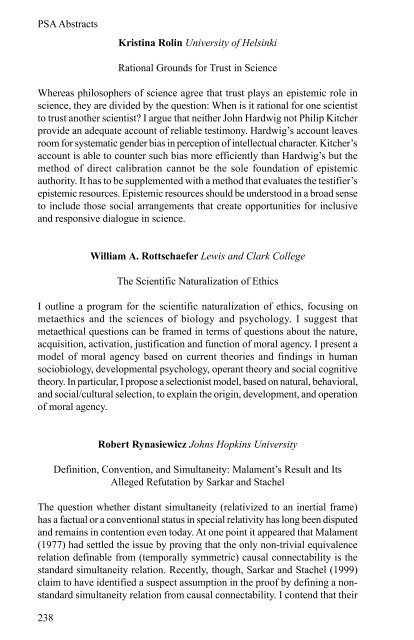2000 HSS/PSA Program 1 - History of Science Society
2000 HSS/PSA Program 1 - History of Science Society
2000 HSS/PSA Program 1 - History of Science Society
Create successful ePaper yourself
Turn your PDF publications into a flip-book with our unique Google optimized e-Paper software.
<strong>PSA</strong> Abstracts<br />
Kristina Rolin University <strong>of</strong> Helsinki<br />
Rational Grounds for Trust in <strong>Science</strong><br />
Whereas philosophers <strong>of</strong> science agree that trust plays an epistemic role in<br />
science, they are divided by the question: When is it rational for one scientist<br />
to trust another scientist? I argue that neither John Hardwig not Philip Kitcher<br />
provide an adequate account <strong>of</strong> reliable testimony. Hardwig’s account leaves<br />
room for systematic gender bias in perception <strong>of</strong> intellectual character. Kitcher’s<br />
account is able to counter such bias more efficiently than Hardwig’s but the<br />
method <strong>of</strong> direct calibration cannot be the sole foundation <strong>of</strong> epistemic<br />
authority. It has to be supplemented with a method that evaluates the testifier’s<br />
epistemic resources. Epistemic resources should be understood in a broad sense<br />
to include those social arrangements that create opportunities for inclusive<br />
and responsive dialogue in science.<br />
William␣ A. Rottschaefer Lewis and Clark College<br />
The Scientific Naturalization <strong>of</strong> Ethics<br />
I outline a program for the scientific naturalization <strong>of</strong> ethics, focusing on<br />
metaethics and the sciences <strong>of</strong> biology and psychology. I suggest that<br />
metaethical questions can be framed in terms <strong>of</strong> questions about the nature,<br />
acquisition, activation, justification and function <strong>of</strong> moral agency. I present a<br />
model <strong>of</strong> moral agency based on current theories and findings in human<br />
sociobiology, developmental psychology, operant theory and social cognitive<br />
theory. In particular, I propose a selectionist model, based on natural, behavioral,<br />
and social/cultural selection, to explain the origin, development, and operation<br />
<strong>of</strong> moral agency.<br />
238<br />
Robert Rynasiewicz Johns Hopkins University<br />
Definition, Convention, and Simultaneity: Malament’s Result and Its<br />
Alleged Refutation by Sarkar and Stachel<br />
The question whether distant simultaneity (relativized to an inertial frame)<br />
has a factual or a conventional status in special relativity has long been disputed<br />
and remains in contention even today. At one point it appeared that Malament<br />
(1977) had settled the issue by proving that the only non-trivial equivalence<br />
relation definable from (temporally symmetric) causal connectability is the<br />
standard simultaneity relation. Recently, though, Sarkar and Stachel (1999)<br />
claim to have identified a suspect assumption in the pro<strong>of</strong> by defining a nonstandard<br />
simultaneity relation from causal connectability. I contend that their
















